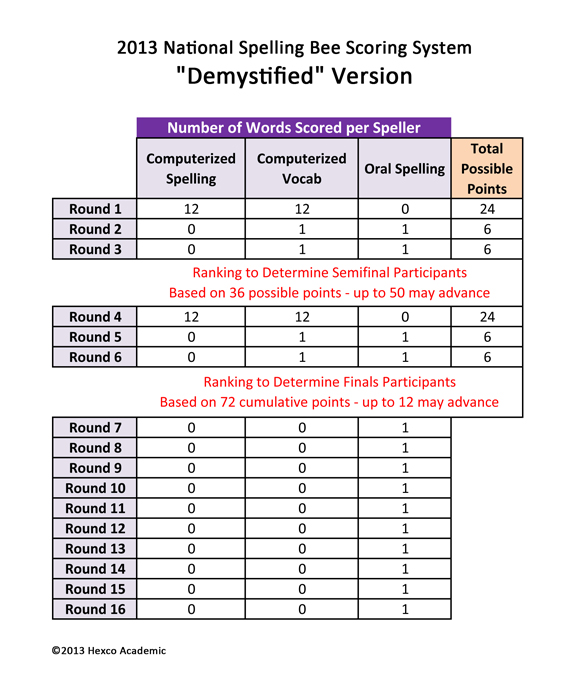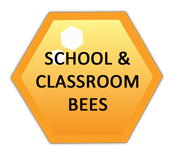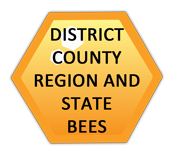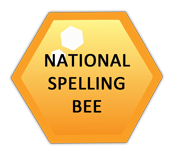HOW TO STUDY FOR THE NATIONAL SPELLING BEE
This bee is the goal for all spellers. Before you head to the National Bee, we recommend that you download our free annual newsletter, After a Spell and read the Round-by-Round report of the last spelling bee in Washington so you better understand where the words in each round come from and how Hexco products fared.
First, make sure you have learned, or continue to master the new list provided by Scripps, Words of the Champions, and then make sure you learn the off-list words on the list provided by Scripps to spellers attending the National Bee, which contains approximately 400 additional words from Regional or State bees. This list should be given to you after the last regional bee which occurs at the end of March. NOTE: In 2017, the National Bee did not use words from the formerly used Spell It list at the National level, instead they used the list of provided words added to spellers accounts in March or April. However they did use the Spell It list in past years, so we do recommend that spellers do know these basic words which have been on the study list for over 10 years (just in case!). Also know the definitions on any given list!
TWO OPTIONS
Next, you have two options; you can learn more words or, you can learn more about words.
Once you reach the National level, you are probably far beyond your original goal of 10,000 words. At this juncture, we recommend that you expand your spelling foundation to about 30,000+ words. Click here to view our word list products, which are arranged by level of difficulty. If you have not studied any products beyond school bee words and Words of the Champions words, we recommend that you consider Spell Buddy books, Verbomania and perhaps Paideia words before moving to the more advanced lists which are New Nat's Notes and Blitz Lists. Of course, this is a general 'rule' of thumb and there are many exceptionally bright spellers who would do well to dive right into New Nat's Notes and the Blitz List. NEW: Now get our most popular word products in eMentor format!
If you are thinking of starting with advanced word products, first consider the following:
- The goal is to get as far as you possibly can in the Bee so you may want to gear your study toward getting past the early rounds first.
- Off-list words used in the early rounds in the Bee tend to use words that are considered good, vocabulary-enriching words. Words like these can be found in Verbomania. These types of words can be found in high-level publications, yet are still words that can be used in a conversation.
- Very advanced words are often comprised of 'parts' of easier words. A foundation of good, vocabulary-enriching words makes learning the advanced words easier (but of course, not easy!)
Questions to ask yourself when deciding which word products to purchase:
- What grade are you in? Is there a chance you could compete next year, or again? If you've still got a chance to compete down the road, you could start with Verbomania and/or Paideia and see how you do! It can't hurt, and it will probably help even if you know a large number of the words in these lists already. These can "round out" your vocabulary.
- Have you already been to the National Spelling Bee? How did you do? If the early rounds took you out of the game, Verbomania and/or Paideia lists may be best for you.
- Have you been to the National Bee before and made it to semi-finals or finals or just missed the cut-off? New Nat's Notes and Blitz List are probably ideal for you!
- Do you already have Verbomania and/or Paideia and know most of the words and their meanings? Then go for New Nat's Notes or Blitz List!
- Are you bored with your current word list and just want a challenge? Check out the sample pages on both New Nat's Notes and Blitz List and see what you think! We also now have Webster Detector which contains 2,500 words that are not in the printed dictionary or have been revised! Remember, most of our word products are also available with audio and keep track of your progress, so if these look tough to pronounce, we've got you covered.
Option 2 - Learn more about words
This option is highly recommended for advanced spellers who have a solid word foundation. If you are going the National Bee, you are definitely in this category so most products listed here can help you "figure out" words or field words that you have never seen before that can help you improve your performance. We have products to help you learn:
- Spelling Rules
- Etymology
- Vocabulary
We recommend these in conjunction with continually building your word foundation, and these types of products can also provide spellers with a reprieve from just spelling which is sometimes needed to keep the journey interesting and meaningful.
HOW TO DECIDE THE BEST PRODUCT FOR YOU
All of our printed products have a "Look Inside" icon so you can get an idea of how words are presented as well as the level of difficulty it presents for you or your speller personally. If you are not sure which word collection is best for you, test your speller with the sample pages from one or more of the products that you are considering. Our spelling comprehension products that cover spelling rules, etymology and vocabulary also have preview icons on their respective pages whether in print and/or digital or computer-based format. If you are considering any of our eMentor products please try our free Demos and view details on product pages. Note that Chrome or Firefox is recommended to use eMentor spelling products (a PC or Mac computer with a keyboard is required).
LOOKING TO BUY MULTIPLE STUDY PRODUCTS?
Consider working back and forth between two collections of words, learning both vocabulary enriching words and esoteric words. Most spellers prefer learning the esoteric words, but almost a third of the written round is comprised of familiar, vocabulary words. Or, try one word list product and one spelling comprehension product. The mix is up to you and your speller! If you still have questions or need suggestions, feel free to email us at hexco@hexco.com or call 830-367-3825.
With our Verbomania and Paideia products, we recommend that spellers become familiar with the meanings in those products, because the multiple-choice vocabulary sections in the National Bee generally use words that we consider to be intermediate to advanced.
The chart below shows how the rounds were accounted for in 2013 based on the point system that included the new vocabulary section. As you can see, Rounds 2, 3, 5, and 6 had one computerized vocab question each -- and this question was worth 3 points, carrying just as much weight as spelling a word correctly on stage.

What is the difference between 1999 Paideia and 2006 Paideia?
The 1999 Paideia contained 3,404 words; the 2006 Paideia contained 4,118. Both contain collections of beginning, intermediate and advanced words, which is a good overall mix, and many of these words have been used as off-list selections. Since Scripps methodically replaced about 20% of their word list annually and often added words, it took approximately six years for a word to rotate onto the Scripps’ list and then off again. Studying from these two lists, which were released seven years apart, ensures very little overlap of words on Paidea lists and few are found in the Scripps current word list. These make an excellent resource for expanding a student’s word foundation. Both lists, along with the current Scripps’ study list will build a collection of about 10,000 words. Using our Spelling Mentor software to learn these Paideia words is one of the easiest ways to master these lists. Valerie’s Supplement is also available for these years. There is overlap with Verbomania and New Nat's Notes.
|
|
Words also in Verbomania |
Words also in New Nat's Notes |
Words NOT in Verbo or NNN |
|
Paideia 2006 (4100 words) |
1500 |
1458 |
1142 |
|
Paideia 1999 (3400 words |
1443 |
1470 |
487 |
Learn spelling rules, Latin and Greek elements and patterns for language families.
TIP: Consider a searchable dictionary to use in conjunction with the Spelling Rules Book and the Etyma products. With a searchable version of Webster’s Third New International Dictionary, your speller can search for all the words that have German in the etymology and are spelled with –ie– somewhere in the word to verify that these are have the long ‘e’ sound. He/she can search for all the words that end in –ible and/or –able, and peruse the list.
A search can be made for all words that have –phag– from the Greek word phagein meaning to eat. There are less than 500, but barely. These are all fun, 50-cent words, such as sarcophagus, meaning flesh eating. Students learn more easily when the new knowledge is related to something they already know, so keep building from one search to another. After you search for –anem– words from the Greek word anemos meaning wind, you’ll find a few words in the list that come from the Greek words a- meaning not and haima meaning blood, as anemic. Now search for all the words in the dictionary that have haima in the etymology. Here they will learn that most words from haima have –hem– in the spelling of the word just –em– as in anemic.
- Consider our Personal Spelling Coach program. This can be instituted at any time. Our professional coaches work with all the products described here and many, many more lists of words that have not been used at bees before or presented in any of our existing products. Their expertise helps students make better choices when encountering an unfamiliar word, and they teach volumes about language families, spelling rules and Latin and Greek elements. They analyze students' spelling to understand how to correct errors, and they explain and encourage students to stay on task and master spelling skills.
SUMMARY
- Expand your spelling foundation to about 30,000+ words.
- Continue with additional words from the Verbomania and New Nat's Notes products until all are mastered.
- New Nat's Notes has 18,000 words, and Verbomania products have 13,000. This accounts for 50% to 60% of the words that will be given as off-list words at most regional bees and at the National Bee. They account for 2/3rds of the words in the written round annually.
- Continue reviewing all words missed from all study products.
- Keep adding words to your repertoire with volumes of the Blitz List which contain very tough words that have rarely been used in spelling bees -- words in this list are of the esoteric ilk of 'off-list' words.
- Finally, don't get caught by surprise on a word recently added to the online dictionary, but not in print! Consider Webster Detector to start learning some of these new or revised words today!
- Study everything you learned up to this point, reviewing missed words (note -- the eMentor program keeps track of all of your missed words so you don't have to!)
- Work with our Personal Spelling Coaching program to continue to learn words that have never been used at bees before.
- Practice, practice, practice!





